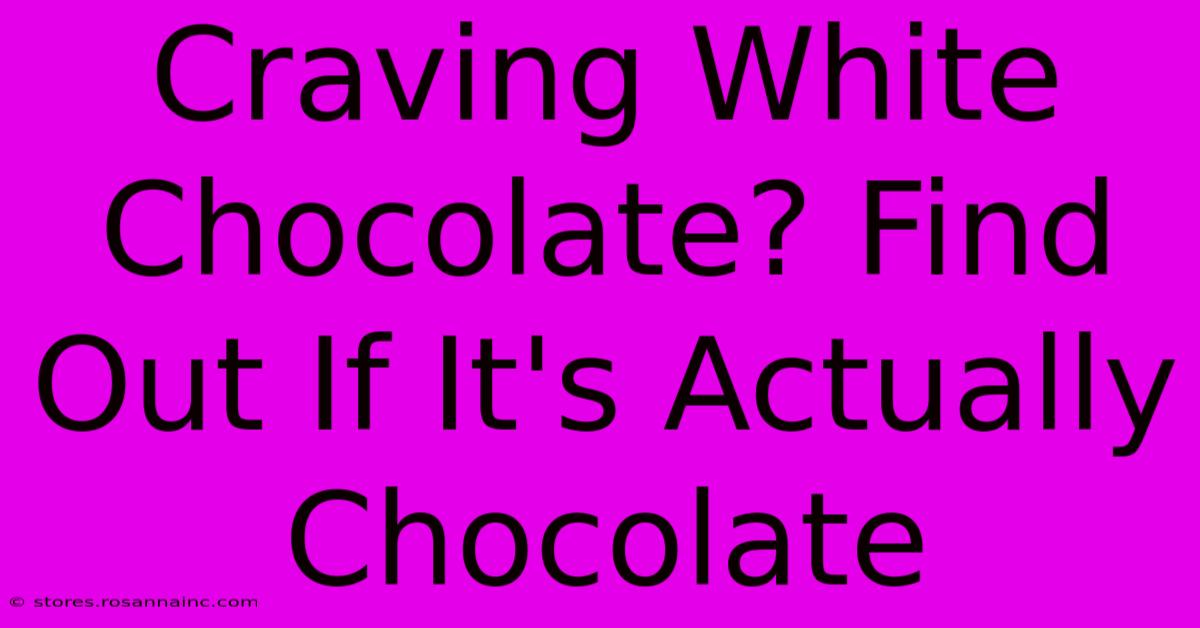Craving White Chocolate? Find Out If It's Actually Chocolate

Table of Contents
Craving White Chocolate? Find Out If It's Actually Chocolate
Are you a white chocolate lover? Many people enjoy its creamy sweetness, but have you ever wondered: is white chocolate really chocolate? The answer is surprisingly complex, and depends on how you define "chocolate." Let's dive into the delicious debate.
The Surprising Truth About White Chocolate
While it shares the name and often the creamy texture, white chocolate significantly differs from dark and milk chocolate in its composition. This difference sparks the ongoing discussion about its true chocolate status.
What Makes Chocolate, Chocolate?
To understand why the debate exists, we need to look at the key ingredient: cocoa solids. Dark and milk chocolate both contain cocoa solids, derived from the cocoa bean. These solids provide the characteristic chocolate flavor and much of its nutritional value.
Cocoa butter, on the other hand, is the fat extracted from cocoa beans. It's the ingredient that gives chocolate its smooth, creamy texture.
The White Chocolate Formula: A Different Story
White chocolate does contain cocoa butter, which explains its creamy texture. However, it lacks cocoa solids. Instead, it primarily consists of sugar, milk solids, and vanilla. This absence of cocoa solids is the primary reason many argue it shouldn't be classified as "chocolate."
The Case For and Against White Chocolate as "Chocolate"
The argument hinges on the definition of chocolate. If you define chocolate strictly by the presence of cocoa solids, then white chocolate fails the test.
However, a more lenient definition might consider the cocoa butter content sufficient to include it under the "chocolate" umbrella. After all, cocoa butter is a crucial component derived directly from the cocoa bean. This broader definition acknowledges white chocolate's connection to the cocoa bean, even if it doesn't include the solids.
The Consumer Perspective
Ultimately, the classification of white chocolate often comes down to personal preference and culinary tradition. For many consumers, the creamy, sweet taste and satisfying texture are enough to classify it as a type of chocolate, regardless of the technical definition.
White Chocolate: A Delicious Indulgence Regardless of Definition
Whether or not you consider white chocolate "true" chocolate, its unique flavor and texture make it a popular treat. Its milder flavor profile allows it to pair well with a variety of ingredients, making it a versatile ingredient in desserts, candies, and even savory dishes.
Enjoy White Chocolate Responsibly
Like any sweet treat, moderation is key. While white chocolate contains cocoa butter, it's also high in sugar and fat. Enjoy it as part of a balanced diet.
Conclusion: The Verdict is Still Out
The debate surrounding white chocolate's true identity is a testament to its unique place in the world of confectionery. While it may not adhere to the strictest definition of chocolate due to its lack of cocoa solids, its delicious taste and cultural significance solidify its place in our hearts (and pantries!). Ultimately, whether it's chocolate or not is a matter of perspective and personal definition. So, go ahead and indulge in your white chocolate cravings guilt-free—it's delicious, regardless!

Thank you for visiting our website wich cover about Craving White Chocolate? Find Out If It's Actually Chocolate. We hope the information provided has been useful to you. Feel free to contact us if you have any questions or need further assistance. See you next time and dont miss to bookmark.
Featured Posts
-
Kendrick Lamar Height Debunking The Myths And Rumors
Feb 10, 2025
-
My Side Of The Mountain Inspiration For A Simpler Life
Feb 10, 2025
-
Stress Free Chapel Wedding Planning Your Dream Day Awaits
Feb 10, 2025
-
Sad Kelce Video Rumor Details Emerge
Feb 10, 2025
-
Is Cuidado Con El Angel The Key To Desired Outcome Find Out Now
Feb 10, 2025
